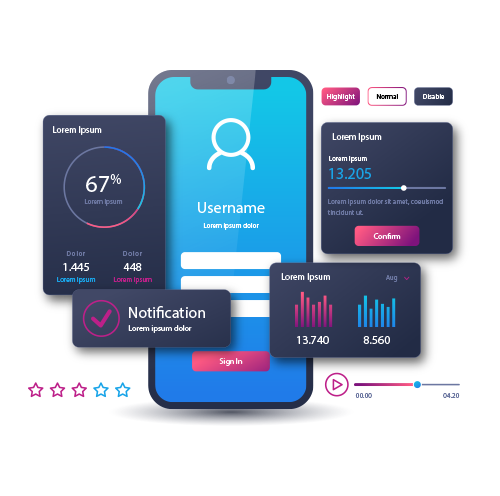Mobile app and web app technologies are developing so quickly that the organization falls into the problem of choosing the correct medium to reach the target audience. Sometimes entrepreneurs don’t have the smallest idea about the difference between them. Also, the task of assessing the correct one for their business is on to them.
Let’s start with understanding the mobile app and website app individually and later compare them to make the right decision about which one is better for your business.
What is a Mobile app?
We use mobile apps on daily basis. Any application that runs on mobile devices with the function of providing a service is mobile application.
Leaders of the mobile app domain are Android and iOS. Most businesses focus on creating an app for both or either of the platforms. This is due to the broad user base for Android and iOS in the global market. Both covering around 75.65% and 22.87% mobile market respectively.
Mobile apps can be further divided into Native and Hybrid mobile apps.
Mobile apps created only for the targeted platform using platform-specific SDK are categorized into Native mobile apps. Most native mobile apps are targeted towards Android Development or iOS development.
Hybrid mobile apps are developed on platforms that will provide you with code that is compatible with all available operating systems. Due to the use of a single code-base, hybrid mobile apps are more popular among startups and small to medium enterprises for having their app created in a single go.
What is a web app?
A web application is a software that completely runs on the web browser. The web application does not need to be downloaded or installed on a local machine. The web app can span over multiple pages or be restricted to a single page.
The benefit of building a web app is that it can be used across web browsers irrespective of the platform. They do not need to have a specific platform or hardware. Hence, reduces the overall development efforts required in contrast to writing code that needs to be migrated over multiple platforms.
The Gsuite from Google is one of the best examples of a web app.
Web apps Vs. Mobile apps
An average person uses a mobile phone than a laptop/desktop. The least daily time spent on mobile and desktop is 132mins and 39mins respectively. The mobile app supports complex functionalities. In web apps, updates are applied directly. Also, the web app doesn’t involve downloading. While web apps need not cater to the underlying platform, the mobile app requires code targeting to the specific platform or hardware. Monetization of web apps is easier compare to mobile apps.
Progressive Web apps – A middle ground to web and mobile apps
PWAs were introduced to provide the properties of the mobile application over a web browser. Using web technologies like HTML, CSS, and JS, progressive web apps provide an experience of using a native mobile application.
Still, the progressive web apps are making progress. The focus is towards creating progressive web apps that have a look and feel exactly like native apps, without having the users download and install any software.

Mobile app – Impact on user experience
- More interactive ways for a user to engage
With the mobile app, you can offer a new channel for engagement to your engagement. Rather than looking at the same text and images as a website.
- Customization
The mobile app allows users to set up their preferences as soon as they are downloaded and customize it to suit their needs. Apps can also track user engagement, and use it to offer custom updates. Making the app more useful to the user.
- Ability to work offline
Mobile apps can run without an internet connection. Although many apps require internet connectivity to perform most of their tasks, they can still offer content and functionality to users while in offline mode.
Web app – Impact on user experience
- Available for all users
The web app can be accessed from any mobile device regardless of the operating system, as long as the internet connection is available. However, it is essential to remember that network access, quality, and speed are all factors that will impact the experience.
- User’s don’t have to update
Users won’t have to spend time installing new updates of your product to experience improvements on the website.
Which is the better option?
If we look at the reports, the numbers do favor mobile apps. Today, consumers spend much time on mobile apps, and this behavior grew during the first half of 2020 when covid-19 was on rise, and it impacted the user behavior up to 23.4%.
Reports also states that there were 71.5 billion first-time app installs during the first half of 2020. However, the right choice depends upon the business objectives. If your goal is to offer mobile-friendly content to a wide range of people, then a mobile website is probably the way to go. However, if you want people to engage better, interact with, and communicate with your customers to drive customer loyalty, a mobile app presents it as a better option.
Mobile App vs. Web App: Which is better for you?
In many cases or maybe for many reasons you may decide that you need a mobile app. ON AIR App Builder will help you create it in 3 simple steps. So, decide on your app choice and Start Now!


